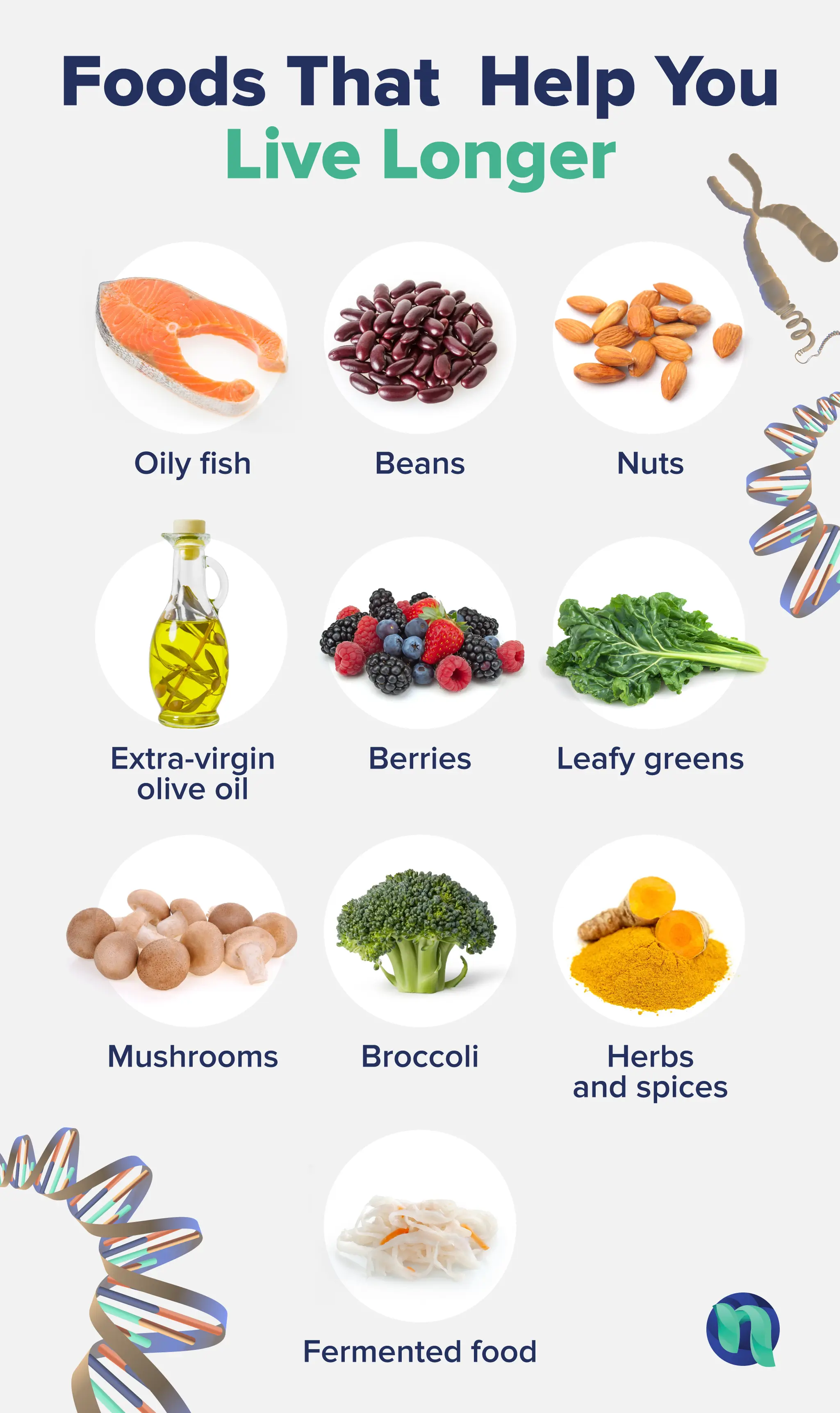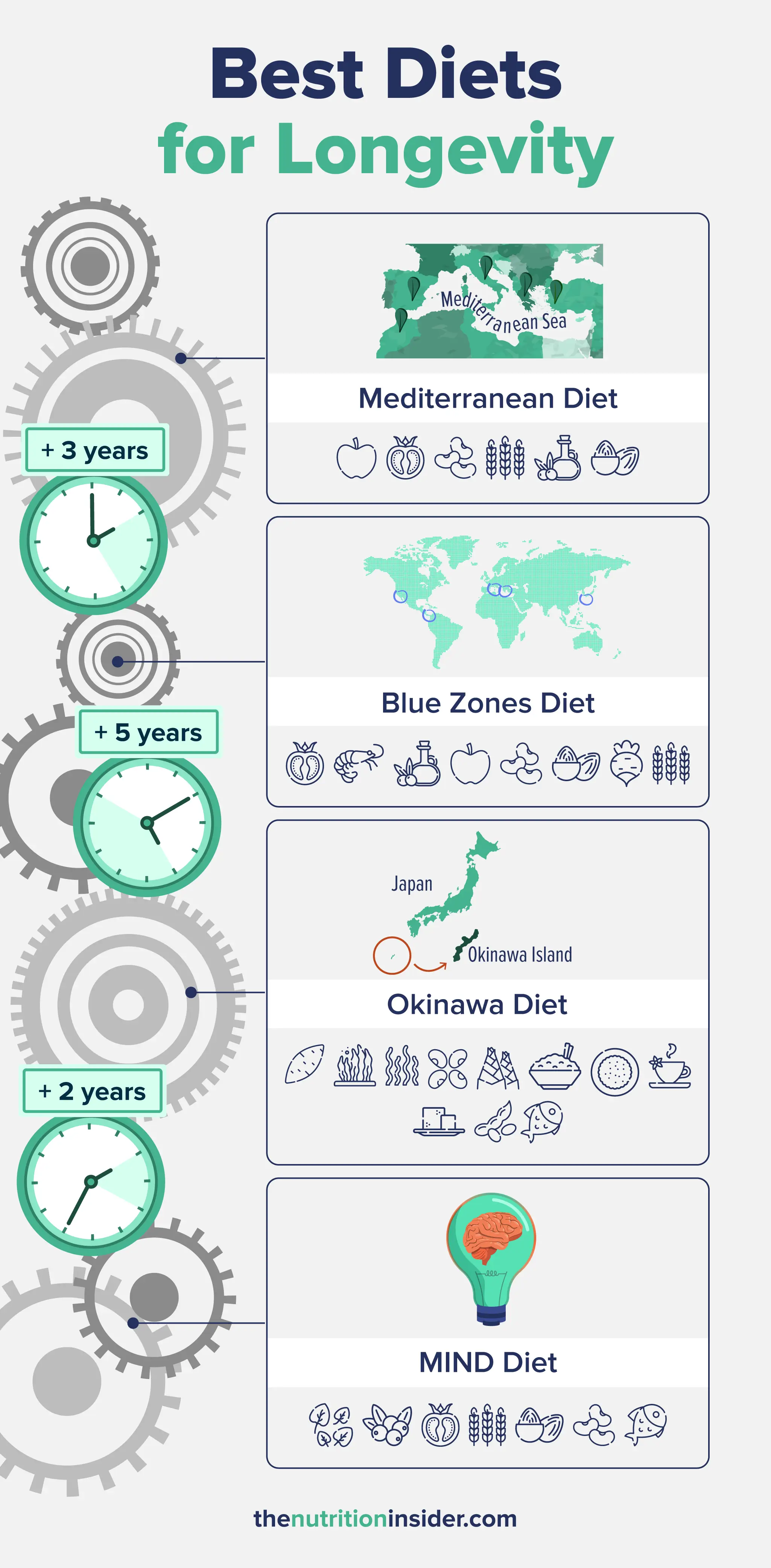Save $40 on your initial consult with a TNI Dietitian!
Talk to a real Dietitian for only $99: Schedule Now
Evidence Based Research To fulfill our commitment to bringing our audience accurate and insightful content, our expert writers and medical reviewers rely on carefully curated research.
Read Our Editorial Policy
Living a long and healthy life is a goal of many, and one of the best ways to learn how to live longer is through what we eat (or don’t).
Although many people think that their lifespans are mostly genetic-based and unchangeable, most of our health and longevity can be altered based on what kind of lives we live—including our food.
This is great news, as you can consider each meal you eat another chance to support a longer lifespan and healthspan, or the years of life in which you remain healthier without developing age-related diseases.
But what are the best foods and diets for longevity and healthy aging? Let’s find out.
Many foods rich in antioxidants, bioactive plant compounds, healthy fats, vitamins, and minerals are excellent choices to support longevity—here are the top ten.
Oily fish like salmon, sardines, herring, tuna, mackerel, and anchovies are rich in the omega-3 fats DHA and EPA, which are linked to heart health, immune function, cognitive health, and more.
Fish also contains lean protein, vitamins D and B2, calcium, phosphorus, iron, zinc, iodine, and magnesium, all of which are necessary vitamins and minerals for overall health.
Research has linked higher omega-3 consumption to better health and increased longevity. One 16-year study of over 42,000 people found that those with the highest blood levels of omega-3 fats had a 15-18% reduced risk of dying from any cause compared to those with the lowest levels.1
Another study showed that those with higher levels of omega-3s in their red blood cells had increased life expectancy by almost five years compared to those with lower levels. Even a 1% increase in blood omega-3 levels was associated with a reduction in early death that was similar to the benefits seen when quitting smoking.2
Just a small note: although tuna is a moderate source of omega 3, there are concerns with mercury and heavy metals contamination, so limit your consumption and ensure you purchase tuna from brands that tests for heavy metals such as Safe Catch.
Beans are the stars of several diets associated with longevity, including the Blue Zones, Mediterranean, and Okinawa diets. Legumes like beans and lentils are loaded with dietary fiber, polyphenols, plant protein, and key minerals that promote longevity.
The high fiber content in beans helps support heart and metabolic health by lowering blood sugar and cholesterol or lipid levels. As cardiovascular disease is the leading cause of death in the United States, adding beans to your daily diet may be one way to prevent it.
One older study found that people who ate more legumes had a reduced risk of dying. For every 20 grams of legumes consumed (less than an ounce, or 1/15th of a can of beans), people had a 7 to 8% reduction in mortality rates.3
All beans, lentils, and legumes are beneficial for health and longevity, but red beans and kidney beans have the most antioxidants, while navy and white beans have the most fiber.
Nuts are an excellent source of healthy fats, micronutrients, fiber, and plant-based protein. The nuts with the greatest antioxidant content include hazelnuts, chestnuts, walnuts, pecans, and almonds, which are rich in quercetin, gallic acid, chlorogenic acid, and ellagic acid.
Some nuts, like walnuts, are unique plant-based sources of the omega-3 fatty acid α-linolenic acid (ALA), which supports cardiovascular, metabolic, and cognitive health. Walnuts are also high in ellagic acid, which reduces inflammation and oxidative stress—a buildup of damaging compounds called reactive oxygen species (ROS) or free radicals that contribute to aging.4
Other beneficial antioxidant compounds in nuts include anthocyanins, flavonoids, lignans, catechin, epicatechin (also found in green tea), and quercetin.4
Eating nuts may be directly linked to longer lifespans. One large study found that people who ate a moderate serving of nuts (1 ounce, or about ¼ cup) about once per day had a 20% reduced risk of death over 30 years.5
Another 20-year-long study of over 120,000 women showed that those who ate the most walnuts (about 35 nuts per week) had a 14% reduction in mortality rates compared to women eating the fewest walnuts.6
The Mediterranean regions are most known for their copious olive oil consumption, which is one reason why eating a Mediterranean-style diet is so nutritious.
Extra-virgin olive oil is a lightly processed oil rich in heart-healthy monounsaturated fats—one of the best for cardiovascular and metabolic health. Both olives and olive oil are loaded with the antioxidant compounds hydroxytyrosol, oleocanthal, and oleuropein, which fight oxidative stress and inflammation. 7
In one study of Greek adults, people over 70 who exclusively used olive oil (rarely or never used other oils) had better markers on the Successful Aging Index (SAI) than those who never or rarely used olive oil. The SAI scores various health, social, lifestyle, and cardiovascular-related risk factors to determine healthy aging potential.8
Berries like blackberries, blueberries, raspberries, and strawberries are loaded with antioxidant polyphenols—especially anthocyanins, the flavonoids that provide berries and other plants with their deep blue, purple, or red color. They also contain quercetin and different types of phenolic acids that provide additional antioxidant and anti-inflammatory activity.
Research has found that regular consumption of blueberries supports cardiovascular, cognitive, metabolic, and eye health, which are important aspects of health and longevity.9
In one study, older adults who took a wild blueberry extract for six months had significant memory improvements and reduced high blood pressure.10
Other research with roundworms (a commonly used animal to study aging) found that blueberry extract significantly increased lifespan. The highest dose of blueberry extract led to an increased lifespan by 44% and improved aspects of healthspan like motility and stress resistance.11
Everyone knows that green veggies are good for us, but the leafy green family—like kale, spinach, beet greens, arugula, Swiss chard, collard greens, and bok choy—are especially beneficial.
One often-mentioned study from 2018 found that 80-year-old adults who ate 1.3 servings of leafy green vegetables per day (1.3 cups of raw greens) had better brain health than those who didn’t eat them, with the equivalent of their brains being 11 years younger cognitively.12
Arugula may especially be beneficial for healthy aging, as this peppery green is one of the best sources of dietary nitrates—vasodilating compounds that convert into nitric oxide in the body and support heart and vascular health.
Dark leafy greens also contain folate, phylloquinone (vitamin K1), α-tocopherol (vitamin E), the flavonoid kaempferol, and the carotenoid lutein.
As mushrooms are in their own fungi kingdom, they are a highly unique food with nutrients rarely found elsewhere.
Some key nutrients and compounds found in mushrooms include a prebiotic fiber called beta-glucan and antioxidants like selenium and ergothioneine—a polyphenol associated with brain health and a reduced risk of heart disease.13
Ergothioneine is so beneficial that researchers have referred to it as a “longevity vitamin,” which may be why studies have shown that eating mushrooms leads to a decreased risk of all-cause mortality (meaning you’re less likely to die from any cause).14,15
All mushrooms are nutritious, but some have more health benefits than others. Cremini and portobello mushrooms contain the most ergothioneine, while functional mushrooms like lion’s mane, chaga, and cordyceps provide benefits above and beyond grocery store mushrooms.
Broccoli is high in many nutrients, including fiber, vitamin C, vitamin K, iron, and potassium—but one of its most important compounds is sulforaphane.
Sulforaphane is a potent antioxidant known as an isothiocyanate that helps with detoxification processes, supports blood glucose management, and may fight against the growth of cancer cells.16
Lab-based and animal studies have shown that broccoli extracts or sprouts extend lifespan and reduce BMI (Body Mass Index), body fat, blood sugar, and blood pressure.17,18
In addition to broccoli, other cruciferous vegetables are also beneficial, including cabbage, bok choy, kale, arugula, and Brussels sprouts.
Herbs and spices are loaded with longevity-supporting compounds, like curcumin in turmeric, rosmarinic acid in rosemary, allicin in garlic, apigenin in parsley, caffeic acid in mint, and gingerol in ginger. Although turmeric, garlic, and ginger are vegetables or roots, we’ll include them in this section based on how they’re typically used.
With their abundance of antioxidant compounds, herbs and spices fight oxidative stress, reduce inflammation, and even provide anti-cancer activity in cells.19
Curcumin is especially associated with longevity, as it benefits cardiovascular health and cognitive function and is involved with the regulation of nutrient-sensing signaling pathways—one of the 12 main hallmarks of aging.20
Lastly, the family of fermented foods like sauerkraut, yogurt, kefir, kimchi, tempeh, kombucha, sourdough, and natto are considered longevity foods.
Due to the fermentation process that introduces bacteria, fermented foods contain healthy probiotic bacteria that can benefit gut health and provide anti-inflammatory and immune-modulating activity.
It’s now known that a healthy gut microbiome is necessary for longevity, and eating probiotic-rich fermented foods is one of the best healthy habits to support your microbiome.21

Several diets or eating patterns prioritize many of the foods we just went over, making them great ways to eat to support longevity.

Diets studied for their impact on longevity include the Mediterranean diet, the diets of the Blue Zones (like Okinawa), and the MIND diet. These eating styles are low in sugar, processed foods, ultra-processed oils, salt, red meat, processed meat, most processed dairy, and alcohol while emphasizing beans, legumes, vegetables, fruit, whole grains, fermented foods, nuts, and seafood.
There is no single food that shortens your life the most—rather, your eating habits as a whole are more likely to shorten your lifespan. Diets regularly high in refined sugar, salt, refined grains, alcohol, ultra-processed foods, and processed meat can all contribute to a shorter lifespan and age-related chronic diseases.
Many foods are considered longevity foods and can help you live longer, such as berries, nuts (especially walnuts), oily fish with omega-3s, fermented foods, beans, legumes, cruciferous vegetables, olive oil, mushrooms, leafy greens, garlic, ginger, turmeric, and other herbs and spices.